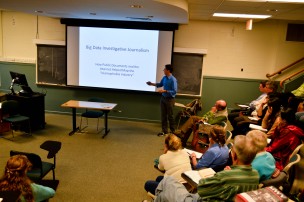Eli Clifton, co-author of the Center of American Progress report, “Fear, Inc,” led a lecture on Thursday, Oct. 2 titled “Big Data Investigative Journalism: How Public Documents and the Internet Helped Map the Islamophobia Industry.” The event, which took place at the Public Affairs Center, was sponsored by the Department of Religion, the Department of Government, the Quantitative Analysis Center, and the Muslim Women’s Voices Project.
Professor of Religion Peter Gottschalk, an organizer of the event, discussed the current state of investigative journalism, ways to compile data, and sources of funding for Islamophobic groups during the presentation.
Approximately 50 University students and staff attended the lecture. The topic was “Fear, Inc.: The Roots of the Islamophobia Network in America,” a report published in August 2011 by the Center for American Progress, an independent, nonpartisan educational institute designed to address 21st-century issues, provide policy ideas, and critique existing policy. “Fear, Inc.” is a document that defines Islamophobia as an exaggerated fear, hatred, and hostility toward Islam and Muslims that is perpetuated by negative stereotypes that result from the marginalization of Muslims from America’s political, social, and civic life. The article attributes the rise of Islamophobia in the United States to a small, tightly networked group of mis- information experts reaching millions of Americans through effective advocates, media partners, and grassroots organizing.
Gottschalk began the presentation by introducing Clifton, outlining his accomplishments, and praising his work.
Gottschalk expressed his interest in Clifton’s work and his reasons for organiz- ing the lecture.
“I was familiar with [‘Fear, Inc’] and I was really impressed that [Clifton] and his co-authors were able to…create a sense of the large picture regarding the forces actively promoting Islamophobia and anti- Muslim sentiment in the United States,” Gottschalk said. “[They demonstrated] the connections between big money donors, the organizations Islamophobes create, and finally the politicians and the media that try to benefit from these perspectives and help to disseminate them in the United States.”
Throughout the lecture, Clifton spoke about the roles that investigative journalism plays and how the creators of “Fear, Inc.” collected data for their work. He presented the software used to detect relevant data.
Furthermore, he spoke about the sources from which professional Islamophobes gathered the money and re- sources, including grants (specifically 990 tax filings) from philanthropic foundations, individuals, and institutional donors.
Clifton noted that he was surprised by some of the research that he and his coauthors conducted.
“I think the thing that surprised me the most is how so little money was able to make such a big impact on the American political discourse and the media,” Clifton said. “It took a relatively small number of donors and a relatively small amount of money to successfully mount a campaign against Muslims in America.”
Clifton also presented a list of the key misinformation experts and promoters of Islamophobia. Additionally, Gottschalk spoke about the ways in which certain pub- lic figures have contributed to anti-Muslim sentiments.
“Some politicians have sought to emphasize that Muslims, both domestically and internationally, represent a clear and present danger to the so-called American way of life,” Gottschalk said. “There’s un- fortunate evidence that local and state gov- ernment suspicions of Muslims and Islam have led to counterproductive over-surveillance of Muslim communities.”
Clifton described how his ideas have been challenged through his research.
“The thing that has surprised me time and time again is that in discussing something that seems relatively safe and uncontroversial, one is constantly running into people’s fears and unwillingness to confront certain trends,” Clifton said. “People want to believe the United States is very open and welcoming, and when you start to challenge that you get very interesting results.”
Clifton added what he hopes to accomplish in the future concerning Islamophobia.
“I think it would be fascinating if we could start talking more broadly about the link between advocates of specific U.S. foreign policy endeavors and domestic Islamophobia in this country,” Clifton said. “I think it’s a link that hasn’t been discussed as much as it probably should.”
Clifton ended the lecture by present- ing quotes from well-known figures in the media that condemned the research and claims made in “Fear, Inc.” These quotes included several written by blogger Pamela Geller, calling the report a pile of dung masquerading as research that read more like a “Mein Kampf ” treatise.
Irvine Peck’s-Agaya ’18, who attended the lecture and subsequent question-and- answer session, noted that she felt that Clifton reinforced her ideas.
“The fact that it was people giving money to specific organizations against people who haven’t really done anything is interesting,” Peck’s-Agaya said. “The ideas against Islam don’t come out of no- where; they are actually funded by specific people.”

Comments are closed